Outsourcing data management is gaining strong interest as businesses face unprecedented data growth and increasingly strict compliance requirements. Building and maintaining in-house teams with advanced technology and regulatory expertise is costly and resource-intensive. This is why many organizations turn to data management outsourcing. In this article, DIGI-TEXX explores the core elements, benefits, workflows, and strategic value of outsourcing data management for modern businesses.

>>> See more:
- What Is Business Process Outsourcing (BPO)? Definition & Benefits
- Business Process Automation Solutions: Benefits, Example & Service Company
- Healthcare BPO Services – Cost Optimization & Improve Care 2026
What Is Outsourced Data Management?
Outsourced data management is the strategic practice of delegating an organization’s data-related operations (including data collection, storage, cleansing, integration, security, governance, and analysis) to a specialized third-party service provider rather than managing these functions internally.
By partnering with expert data management providers, businesses access advanced technologies and specialized expertise that transform raw data into actionable intelligence. Organizations typically achieve 40% to 70% cost savings while improving data accuracy to 99.95% or higher, freeing internal teams to focus on strategic growth.
This approach has become increasingly critical as businesses generate approximately 2.5 quintillion bytes of data daily. With 76% of organizations struggling to understand the information they collect, outsourcing data management provides the expertise, technology, and processes needed to turn data from an overwhelming challenge into a competitive advantage.
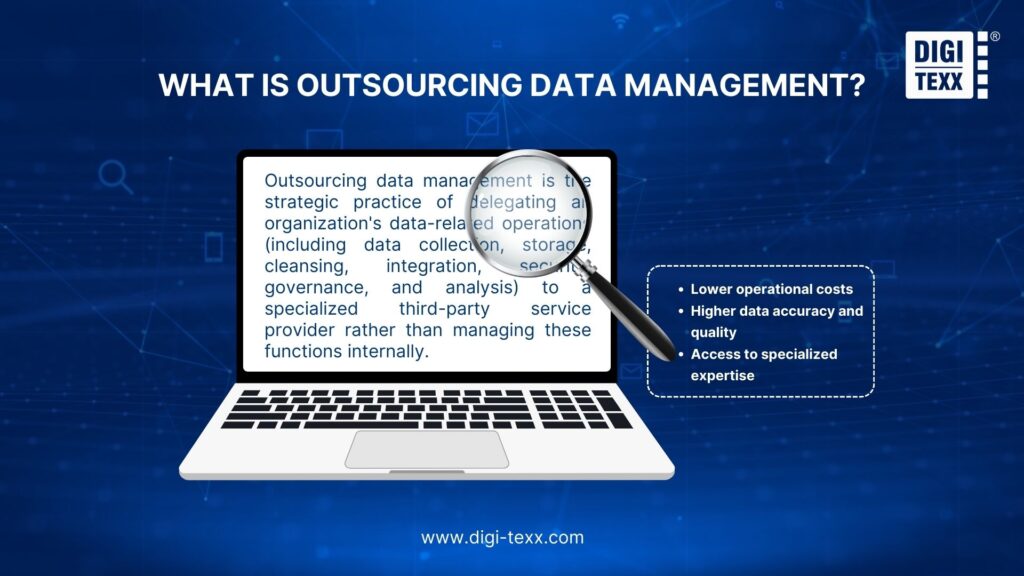
Benefits Of Outsourced Data Management
There are 6 practical benefits to implementing data management outsourcing:
- Cost Savings: Businesses do not need to invest in recruiting, training and paying an internal team (which is very expensive and scarce). In addition, you will also save on software licensing, infrastructure and maintenance costs. Flexible pricing models from data outsourcing companies allow you to only pay for what you use.
- Focus on Expertise and Technology: Professional service providers will always have a team of experts with extensive skills in the latest data management technologies, from database administration, data engineering to automation tools.
- Improve Data Quality and Consistency: Professional outsourced data management teams have a single goal: ensuring data accuracy. Units will apply multi-layered QA/QC processes and automated tools to detect errors, ensuring that data is always consistent, clean and reliable for decision making.
- Focus on Core Competencies: Day-to-day data management tasks are often time-consuming but not core competencies for most companies. By implementing data management outsourcing, businesses will free up their valuable internal resources to focus on strategic activities, innovation and business development.
- Flexible Scalability: A business’s data needs can change suddenly (e.g., during peak seasons, or when launching a new product). An outsourcing partner can quickly increase or decrease the size of the team according to your needs, something that an internal team would find difficult to meet.
- Enhanced Security and Compliance: Data security is an extremely serious issue. Reputable data outsourcing companies often invest heavily in security measures and have international certifications (such as ISO 27001, GDPR, HIPAA). Service providers will understand the complex regulations on data privacy and help your business minimize the risk of breach.
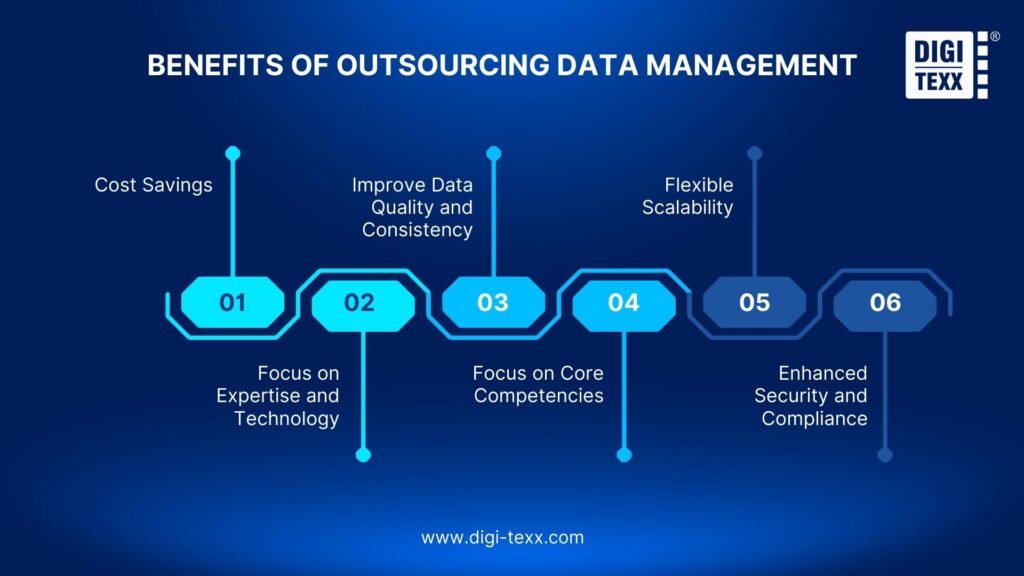
>>> See more:
- Top 7 Free AI Business Document Analysis Tools 2026
- Top 10 Data Entry Outsourcing Companies to Hire in 2026
- Outsourced data annotation services: List of best companies to work for
Core Elements Of Data Management Outsourcing
When a business decides to use data management outsourcing services, it is not simply handing over its data to a third party. It is in the mindset of looking for a partner capable of performing a series of complex tasks that require high expertise. A reputable data outsourcing company will provide a comprehensive service portfolio, including:
Data Entry & Processing
Data entry is the process of converting data from different sources (such as paper documents, PDF files, images, forms) into a structured digital format in a computer system. The next step, data processing, will include sorting, classifying, calculating and converting raw data into meaningful information.
Looking at the overall perspective, it can be seen that the scale of this work in large organizations is very large. Errors in data entry can lead to serious incorrect analysis. Professional outsourced data management providers always apply strict quality control (QA) processes, always apply OCR and RPA technologies to ensure accuracy up to 99.99% as well as ensure fast processing speed, helping businesses save time and operating costs.

Data Cleansing & Validation
Dirty data—data that is inaccurate, incomplete, duplicate, or inconsistent—is a hazard to the analysis process. Data cleansing is the process of correcting or removing these errors. Next, data validation is the process of ensuring that the data adheres to established rules and standards (e.g., email format must be correct, postal code must exist).
This is one of the most important benefits of data management outsourcing. Outsourced experts use specialized tools and advanced algorithms to comb through millions of records, standardize information (e.g., ‘United States’, ‘USA’, ‘U.S.A’ into a single format), and remove duplicate records. The result is a reliable data set, which increases the value of business data management activities.
Data Integration & Migration
The common situation is that businesses today have data scattered across different silos: CRM systems, ERP, accounting software, Excel spreadsheets, etc. The data integration step is the process of combining data from these different sources to create a unified and comprehensive data source.
Data migration is the process of transferring data from one system to another (e.g., moving from an on-premises server to the cloud, or upgrading to a new ERP system). This is a technical task that carries many risks such as data loss or business disruption. An experienced data outsourcing company will have to create a detailed plan, carry out the data migration to ensure safety and ensure the integrity of the data throughout the process.
Database Management & Maintenance
Databases are not just set up and left there, they need to be continuously managed and maintained to ensure performance, security and availability. Database management is a step that includes tasks such as query optimization (to generate reports faster), managing user access, and monitoring system performance.
Meanwhile, Maintenance activities will include activities such as regular backups and recovery to prevent disasters, updating security patches, and planning for capacity expansion as data grows. A professional data management outsourcing unit will help businesses rest assured that their data assets are always protected and operating at optimal performance.
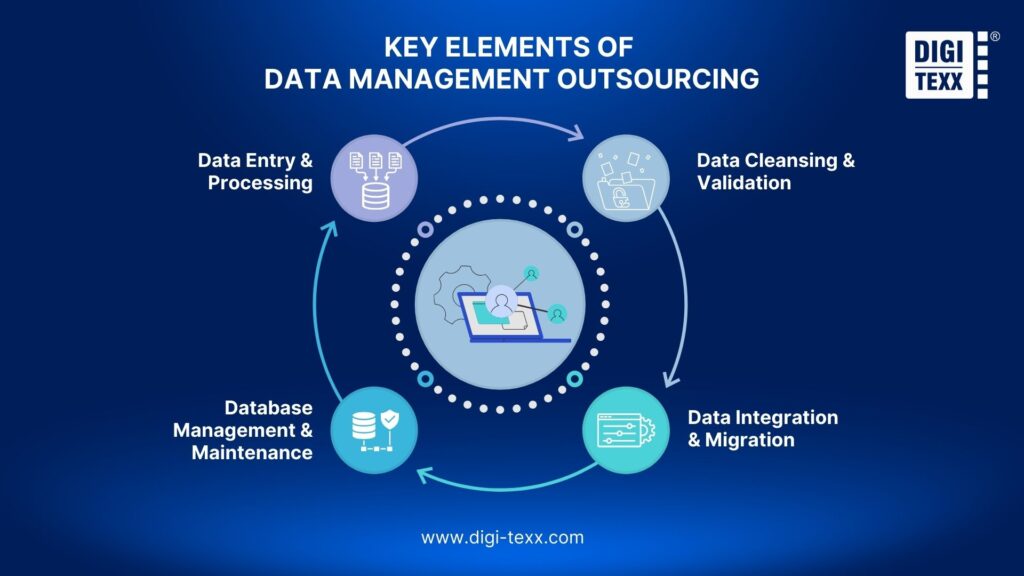
>>> See more:
- Best Insurance Claims Processing Outsourcing BPO in the US 2026
- Top 10 Best big data processing tool for Business 2026
Current Trends In Outsourced Data Management
Outsourced data management is evolving rapidly as businesses adapt to digital transformation, rising data volumes, and stricter compliance requirements. To stay competitive, organizations are embracing new technologies, modern workflows, and skill-driven service models. Below are the key trends shaping outsourced data management today.
Working In The Cloud
Cloud-based platforms have become the foundation of outsourced data management. They enable secure data access, real-time collaboration, scalable storage, and seamless integration with enterprise systems, while reducing infrastructure and maintenance costs.
Process Improvements
Service providers are focusing on standardizing and optimizing data workflows to improve accuracy, turnaround time, and cost efficiency. Clear process design and continuous optimization help minimize errors and ensure consistent data quality.
The Rise Of Automation
Automation technologies such as AI, OCR, and RPA are increasingly used to reduce manual data entry, accelerate processing, and enhance accuracy. Automated data extraction and validation allow providers to handle larger volumes with greater reliability.
Staff Upskilling
As automation increases, BPO teams are investing in upskilling their workforce. Data professionals are trained in quality control, analytics, compliance, and technology management, enabling higher-value outsourced data management services.
>>> See more:
- Top 10 Data Processing Software For Business 2026 – Best Tool Reviewed
- How to Automate Documentation in 2026: Processes, Tools & Examples
- What are the 6 steps of the data analysis process?
What Are The Negative Impacts Of Outsourcing?
Despite its cost and scalability advantages, outsourcing data management can present 6 risks if not properly controlled:
- Security and privacy risks: Sharing data with third-party providers increases exposure to breaches, especially when vendors lack strong security measures or use unvetted subcontractors.
- Loss of control and visibility: Outsourcing data management can reduce direct oversight of data workflows, making it harder to ensure data quality and regulatory compliance such as GDPR.
- Data quality concerns: Outsourced data may be inconsistent or inaccurate, often requiring additional time and cost for cleansing and validation.
- Operational dependence on vendors: Over-reliance on external providers can lead to slower response times and business disruption if vendor performance declines.
- Cultural and ethical concerns: Some organizations associate outsourcing with ethical issues, including labor practices and wage standards in offshore locations.
- Loss of internal expertise: Long-term outsourcing data management may weaken in-house capabilities and reduce organizational agility.
Note: According to Sonatfy’s analysis, these risks can be mitigated through careful vendor selection, clear SLAs, and strong governance.
>>> See more: Top 7 Document Scanning Software for Businesses
Signs That It’s Time To Outsource Your Data Management
Many businesses still try to manage their data themselves until they encounter insurmountable barriers. If your business notices any of the following signs, it may be time to seriously consider outsourcing data management to ensure you are not missing out on opportunities to grow your business:
- Poor and inconsistent data quality: When business reports are frequently erroneous, sales teams complain about inaccurate customer information, and more time and resources are spent adjusting data than actually using it, these are clear signs that your business data management process is in trouble.
- Rising operating costs: When the cost of IT staff and data entry staff, software costs and infrastructure maintenance are exceeding the set budget on all three ends, showing that the size of the business is gradually expanding but is still using old data processing technologies, that is when the need for data management outsourcing services to apply new technologies (such as AI or Machine Learning) systematically.
- Concerns about Security and Compliance: Businesses will have to worry about the risk of data leakage or are unsure whether they are fully compliant with regulations such as GDPR or international agreements on personal data protection. Entrusting a professional unit is an investment to solve these problems at the root so that things do not go further.
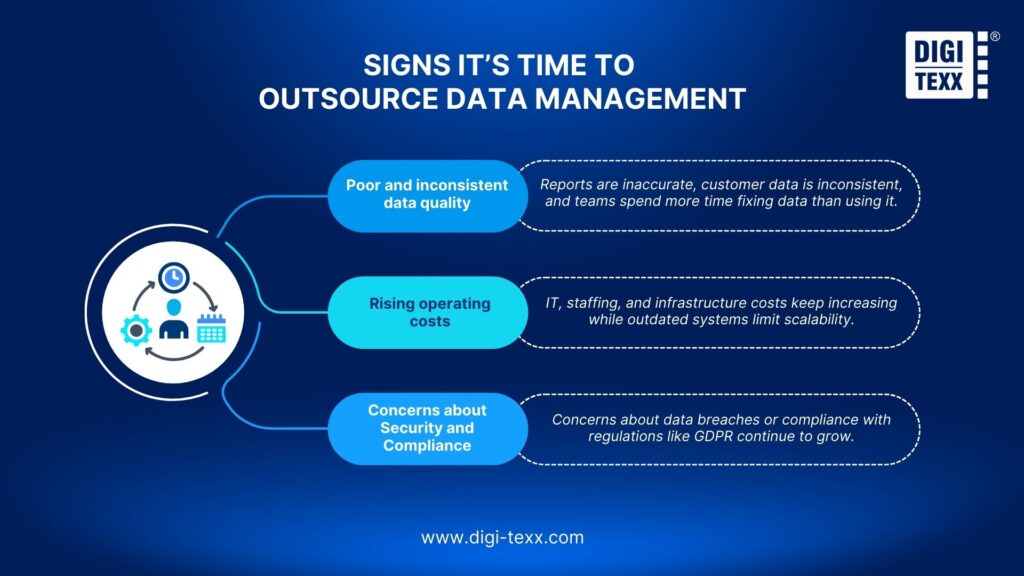
What Are The Roles In Data Management?
Many outsourcing providers, especially in countries like Vietnam, specialize in outsourcing data management by building dedicated teams that handle a wide range of data-related tasks. Common roles that can be outsourced include:
- Data architects.
- Data analysts.
- Data engineers.
- Data entry specialists.
- Data quality analysts.
- Data governance analysts.
- Data compliance officers.
- Data management specialists.
Choosing Between Offshore And Onshore Providers
But once a business has decided to outsource, another important question arises: should you choose a domestic or foreign provider?
Onshore Providers
- Pros: They are in the same time zone, speak the same language, and have a deep understanding of the local cultural and legal context. This makes it easier to communicate and handle sensitive data that requires strict national regulations.
- Cons: Costs are often significantly higher due to the high labor and operating costs in developed countries (such as North America, Western Europe).
Offshore Providers
- Pros: The biggest advantage here is cost. Countries like Vietnam, India, and the Philippines offer high-quality services at much more competitive prices. They also have a large pool of highly trained IT and data processing personnel who are available 24/7 (which helps to offset the time zone difference).
- Disadvantages: There may be initial challenges with language or cultural barriers, although leading providers will still have project managers who speak English or the client’s native language.
So which option is best?
For many businesses, especially in Europe and North America, outsourcing data management to offshore locations such as Vietnam and Southeast Asia is the optimal choice. This option balances significant cost savings with maintaining a high level of service quality.
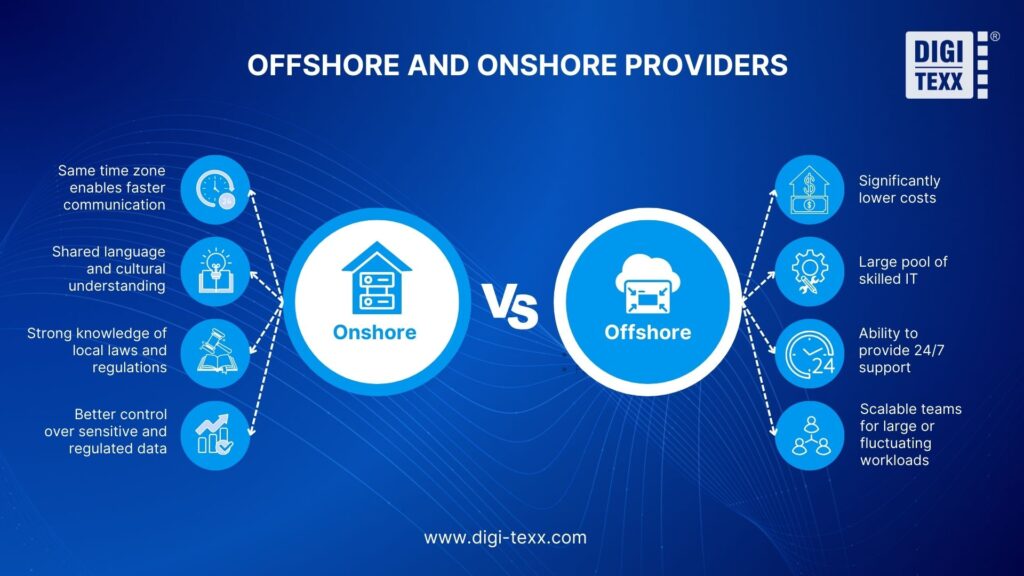
How To Choose The Right Data Management Outsourcing Provider?
Selecting the right data management outsourcing provider is one of the most critical decisions your business will make. The wrong choice can lead to data security issues, poor quality outputs, and operational disruptions. Here’s a comprehensive guide to help you choose the ideal partner for your data management needs:
1. Data Security And Compliance Credentials
Data security should be your top priority when outsourcing. Look for providers with:
- International certifications such as ISO 27001, GDPR compliance, HIPAA (for healthcare).
- Robust security measures including encryption, secure data transfer protocols, and access controls.
- Clear data privacy policies and breach response procedures.
- Registration with relevant regulatory bodies (NPC, PEZA, etc.).
Never compromise on security. Ask for detailed documentation of their security practices and compliance certifications before proceeding.
2. Quality Assurance And Accuracy Standards
Quality determines the value of your data. Evaluate providers based on:
- Multi-layered QA/QC processes and automated validation tools.
- Guaranteed accuracy rates (reputable providers achieve 99.9%+ accuracy).
- Error handling and correction procedures.
- Regular quality metrics and performance reporting.
- Proven track record of delivering clean, consistent, and reliable data.
Request examples of their quality control workflows and ask about their error rates to ensure they meet your standards.
3. Industry Expertise And Technical Capabilities
Choose providers with relevant experience and modern technology:
- Proven expertise in your specific industry (healthcare, finance, retail, real estate, etc.).
- Advanced tools and automation technologies (AI, OCR, RPA for data extraction and validation).
- Cloud-based platforms for secure access and scalability.
- Ability to integrate with your existing systems (CRM, ERP, accounting software).
- Successful case studies or client testimonials from similar businesses.
A provider with deep industry knowledge will better understand your compliance requirements and data sensitivity issues.
4. Scalability And Cost Transparency
Ensure the provider can grow with your business while maintaining cost efficiency:
- Ability to quickly scale up or down based on changing requirements.
- Flexible pricing models (per hour, per transaction, or fixed monthly fees).
- Clear cost breakdown with no hidden fees or unexpected charges.
- Support for peak periods and seasonal fluctuations.
- Competitive pricing that balances cost savings with quality (offshore providers can reduce costs by up to 70%).
While cost savings are important, focus on value and return on investment rather than just the cheapest option.
5. Communication And Service Level Agreements (SLAs)
Effective communication and clear agreements are essential for success:
- Strong English proficiency and dedicated account managers (consider locations like the Philippines with high English proficiency rankings).
- Well-defined SLAs with measurable performance metrics (accuracy rates, turnaround times, availability).
- Transparent reporting on performance, quality, and compliance.
- Responsive communication protocols and overlapping work hours for real-time collaboration.
- Clear terms for dispute resolution, contract termination, and continuous improvement.
FAQs About Outsource Data Management
What Are The Four Types Of Data Management?
The four main types of data management are commonly categorized as:
- Data Storage
- Data Integration
- Data Governance
- Data Security
These types focus on how data is stored, connected, governed, and protected, ensuring it is accessible, reliable, and usable for business objectives.
What Are The 7 Principles Of Data Management?
The seven core principles of data management, as defined by the GDPR, guide how organizations should handle personal data responsibly. These principles are:
- Lawfulness, fairness, and transparency – Data must be collected and used legally, fairly, and in a transparent way.
- Purpose limitation – Data should be collected for specific, legitimate purposes only.
- Data minimization – Only the data that is truly necessary should be collected and processed.
- Accuracy – Data must be kept accurate and up to date.
- Storage limitation – Personal data should not be stored longer than necessary.
- Integrity and confidentiality – Data must be protected against unauthorized access, loss, or damage.
- Accountability – Organizations are responsible for complying with these principles and demonstrating compliance.
What Are The 5 C’s Of Data Management?
The 5 C’s of data management outline key principles that help organizations manage and use data responsibly and ethically, including:
- Consent: Ensuring data is collected and used with proper permission.
- Clarity: Clearly defining how data is collected, used, and shared.
- Consistency: Maintaining uniform data standards across systems and processes.
- Control and Transparency: Giving stakeholders visibility and control over data usage.
- Consequences and Harm: Considering potential risks, impacts, and misuse of data.
What Is The Difference Between A Data Manager And A Data Analyst?
A data manager is responsible for organizing, maintaining, and protecting data to ensure it is accurate, secure, and accessible. A data analyst focuses on examining data to identify trends, generate insights, and support business decisions.
Both roles are essential for modern businesses. Data management ensures data reliability, while data analytics transforms data into actionable insights.
Outsource data management enables businesses to achieve 40-70% cost savings while improving data accuracy to 99.95% or higher. By partnering with specialized providers, organizations gain access to advanced technologies like AI, OCR, and RPA, allowing internal teams to focus on core competencies while experts handle data entry, cleansing, integration, and database maintenance.
If you’re struggling with overwhelming data volumes or high in-house costs, DIGI-TEXX offers comprehensive data management solutions tailored to your business needs. Contact DIGI-TEXX today for a consultation and discover how outsourcing can transform your data into a competitive advantage.
DIGI-TEXX Contact Information:
🌐 Website: https://digi-texx.com/
📞 Hotline: +84 28 3715 5325
✉️ Email: [email protected]
🏢 Address:
- Headquarters: Anna Building, QTSC, Trung My Tay Ward
- Office 1: German House, 33 Le Duan, Saigon Ward
- Office 2: DIGI-TEXX Building, 477-479 An Duong Vuong, Binh Phu Ward
- Office 3: Innovation Solution Center, ISC Hau Giang, 198 19 Thang 8 street, Vi Tan Ward
References:
- DAMA International (.org) https://www.dama.org/
- ICO – Information Commissioner’s Office (.org.uk) https://ico.org.uk/


